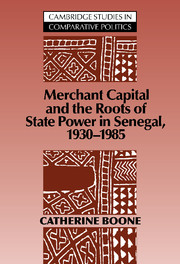Book contents
- Frontmatter
- Contents
- List of tables and figure
- Preface and acknowledgments
- Introduction
- 1 Capital and contingencies of postcolonial politics
- 2 The colonial market
- 3 Consolidation of a regime: Neocolonialism in the 1960s
- 4 Growth of Senegal's textile industry, 1960–1975
- 5 Reappropriation of the state: The 1970s
- 6 Demise of the Dakar textile industry
- Conclusion: States, capital, and capitalist states
- Appendix: Exchange rates
- References
- Index
5 - Reappropriation of the state: The 1970s
Published online by Cambridge University Press: 13 October 2009
- Frontmatter
- Contents
- List of tables and figure
- Preface and acknowledgments
- Introduction
- 1 Capital and contingencies of postcolonial politics
- 2 The colonial market
- 3 Consolidation of a regime: Neocolonialism in the 1960s
- 4 Growth of Senegal's textile industry, 1960–1975
- 5 Reappropriation of the state: The 1970s
- 6 Demise of the Dakar textile industry
- Conclusion: States, capital, and capitalist states
- Appendix: Exchange rates
- References
- Index
Summary
[T]he state, born of the colonial occupation, has been the object of multiple processes of reappropriation which move it steadily away from its original form.
Jean-François Bayart 1989:258The neocolonial state assumed a dual task. Sustaining processes of economic growth set in motion under colonial rule was the first. The second was creating and maintaining a form of political order that would make this possible. Ann Phillips (1989) argued that its predecessor, the colonial state, had failed to reconcile these dual imperatives, for economic growth tended to destabilize mechanisms of social control (such as indirect rule) that underpinned colonial state power. This contradiction was manifest starkly in the postwar crises of the colonial political economy. Wartime exploitation of the colonies, followed by public investment to break the deadlock of economic stagnation, unleashed social forces that the colonial state could not contain – including new working classes, ambitions indigenous merchant strata, and the postwar nationalist elite.
Independence and the political arrangements of the 1960s worked to incorporate these social strata into the sphere of state control. Coalitions forged within the structures of postcolonial states allowed disparate but powerful elements within African societies to share in the benefits of maintaining the economic status quo.
- Type
- Chapter
- Information
- Merchant Capital and the Roots of State Power in Senegal1930–1985, pp. 165 - 206Publisher: Cambridge University PressPrint publication year: 1992



